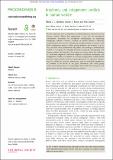Intrafamily and intragenomic conflicts in human warfare
Abstract
Recent years have seen an explosion of multidisciplinary interest in ancient human warfare. Theory has emphasised a key role for kin-selected cooperation, modulated by sex-specific demography, in explaining intergroup violence. However, conflicts of interest remain a relatively underexplored factor in the evolutionary-ecological study of warfare, with little consideration given to which parties influence the decision to go to war and how their motivation may differ. We develop a mathematical model to investigate the interplay between sex-specific demography and human warfare, showing that: the ecology of warfare drives the evolution of sex-biased dispersal; sex-biased dispersal modulates intrafamily and intragenomic conflicts in relation to warfare; intragenomic conflict drives parent-of-origin-specific patterns of gene expression – i.e. 'genomic imprinting' – in relation to warfare phenotypes; and an ecological perspective of conflicts at the levels of the gene, individual and social group yields novel predictions as to pathologies associated with mutations and epimutations at loci underpinning human violence.
Citation
Micheletti , A J C , Ruxton , G D & Gardner , A 2017 , ' Intrafamily and intragenomic conflicts in human warfare ' , Proceedings of the Royal Society B: Biological Sciences , vol. 284 , no. 1849 , 20162699 . https://doi.org/10.1098/rspb.2016.2699
Publication
Proceedings of the Royal Society B: Biological Sciences
Status
Peer reviewed
ISSN
0962-8452Type
Journal article
Description
A.J.C.M. is supported by a Ph.D. studentship from the School of Biology, University of St Andrews, and A.G. is supported by a Natural Environment Research Council Independent Research Fellowship (NE/K009524/1).Collections
Items in the St Andrews Research Repository are protected by copyright, with all rights reserved, unless otherwise indicated.

